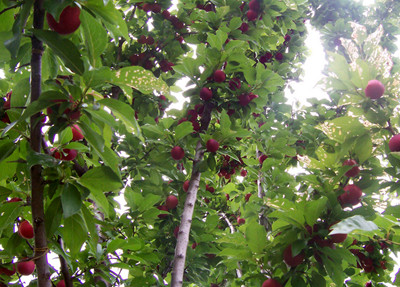8th Sunday in Ordinary Time - Known by its Fruit
The parables that Jesus offers in today’s gospel have one thing in common. Each of them is concerned with the qualities required for authentic discipleship. The “blind” who cannot see their own faults are always ready to point out the shortcomings of others. Those who resist personal conversion are in no position to lead others to conversion. And a false heart cannot be a truthful and effective witness.

Jesus is a very difficult model to follow as much now as he was for the early Christians. He seems to make outrageous demands on our sense of the reasonable. He believes that we can transcend the limitations of our fragile nature and he expects us to believe this as well. He preaches the beatitudes and it sounds like a litany of foolishness. Be poor, be meek, be hungry and thirsty, be persecuted and then you will be happy! Do this and you will be whole and holy like your Father in Heaven.
God’s love is effective only because it produces good fruit for the benefit of others. The ministry of Jesus flowed from his belief that living in love was living in God. He spent his life trying to share this belief with others and to allow that belief to transform their lives. Those who sat listening to his Sermon on the Plain not only heard his words but more importantly they saw him live those words to the fullest.
Every Christian community since then has sought to act as He acted, wanting to make the same Spirit that moved Jesus visible in society. Seeing, hearing, touching the hearts of others and speaking as he did are characteristics of all disciples. Loving God and loving neighbor requires the ability to be with people in their experiences of being vulnerable, broken, joyful, needy, searching and questioning.
These experiences are common to all disciples. They should be the means by which we can help others articulate more clearly and more meaningfully the reality of God's Spirit at work in their lives. But it is no easy task. We ourselves need to be affirmed again and again in the belief that our God is intimately a part of the ups and downs of our everyday lives. When we live in love, we live in God. We are the potter's vessel, easily broken and yet we are temples of the Spirit. We are called to be bread. We are blessed, broken and we are given.
Everything and everyone is charged with the power of God's presence. This is true power. We are called to witness this by our words and our actions. The truly powerful are creators not destroyers, builders not demolishers, life-givers not killers, fixers not complainers, nurturers not bullies.
Our life in the Spirit results from his gift and our cooperation. Our part is to remove obstacles to growth, and one of our positive goals is to develop a loving and compassionate attitude toward our fellow travelers on the journey of faith. It is for us to help them to bear fruit and to let God take care of the rest.